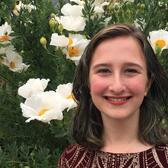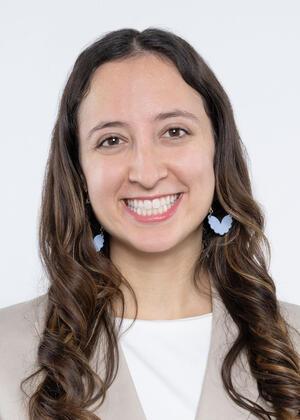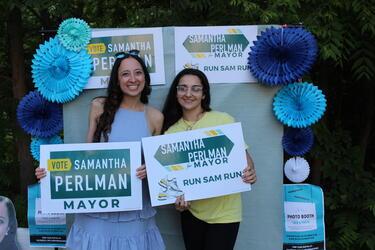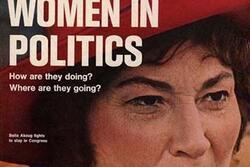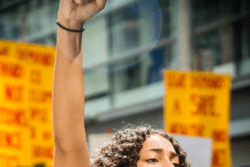Q & A with Samantha Perlman, City Councilor and Mayoral Candidate
This interview has been edited and condensed.
JWA: You’re the youngest female city councilor in Marlborough history. What inspired you to run?
Samantha Perlman: I was inspired by a lot of the women I saw running for office who had been very involved in my local community where I grew up. I got involved [in politics] in college and when I moved back to Marlborough, I was working at a civic education nonprofit and was helping young people make a difference in their communities when I thought, “I'm living where I'm from. What am I doing to make a difference?”
I was certainly very taken aback by how disengaged the Marlborough leadership was at the local level. The councilors had been there forever, and I didn't even know who they were. I felt like the relationship between local government and the community should’ve been different, and figured if I wanted to see it, I should be willing to do it myself, especially to have a young Jewish woman in those positions.
Another inspiration was a Jewish congresswoman, Bella Abzug. I did a lot of reading and saw an article mentioning Abzug, who I think is so amazing. I was thinking, “I never heard of her. Why?” So I went down a rabbit hole of reading her guide to political power and biography and was so impressed with this individual who worked in local, state, and national politics, and was able to do so much and was so confident in herself. That really resonated. Having those leaders in our lives is really important, and I see myself as that for other people who are looking up to me and saying, “Wow, this is something I could do as well.”
JWA: Along the campaign trail, were there any unexpected obstacles you faced as a young candidate or challenges that you faced as a female candidate?
SP: Yes—sadly, we're not in a world where those challenges do not arise. I think there are often assumptions made about what leadership looks like physically. So when you go knock on someone's door, asking for their vote, they might assume that you’re not the candidate or that you're selling Girl Scout cookies or you're volunteering, and they don't give you the time of day.
Other times there are the reactions when you share that you're running for office. “Oh, wow. How old are you?” Particularly for young women, there aren't a lot of peers that I have in this space, especially running for the mayor's seat, which is an executive role. So oftentimes, people look at someone like me, in their 20s, and think, “Oh, she's either really young or she's married with all these children,” and there's no in between. People have these binaries of what roles that women can play. And that's really harmful, because we exist in all different ways and spaces and are valuable at every interval of our lives.
But we do need the younger generation stepping up. Because otherwise, these decisions are going to be made changing our whole lives, and we're never going to have an opportunity to influence those.
My response when people say, “Oh, you're really young” is “I've actually been your city councilor the last four years. So I'm actually not as young as I used to be.” Kind of making a joke out of it and moving on. And usually people are impressed by that. It really comes together when you talk to people.
So it is frustrating, but I always think about the fact that if it was easy, it would already be done. It’s like I'm constantly kind of pushing up against a wall, but in every field, there needs to be someone who breaks down that wall, and it’s not fun to do it. Nobody wants to be the first one to do something, but it's so important that we are changing what people's perceptions are in every field. And certainly in politics, there's a huge lag in women's representation. I think in Massachusetts, less than 30% of mayors are women. That’s a pretty horrible number, and I'm hoping to change that, one election at a time.
JWA: When you encounter this resistance, how do you push through that?
SP: Well, definitely in the beginning, you take it personally. You're thinking, “Oh, my gosh. This is a one-on-one interaction and someone was really unkind towards me.” But then I started to recognize that it said a lot more about that person than it did about me. When you catch somebody and you're trying to tell them about a campaign, they're coming from all different angles. They could have had a horrible day dealing with childcare or pets or work and so they might just say things, and it really is a reflection of where they are in that moment and not about your worth or your contributions. That mindset helps me distinguish who I am in my identity separately from that interaction.
Ultimately, some people are really negative, and you just never meet them at that level. I say, “Thank you so much for your time. I really appreciate it. I hope you have a great day.” And just let it go, because there's no reason to get negative when other people are nasty. You always have to take the high road, which is hard. But I will say each election has gotten better for me. Maybe because people know who I am more, but also, I'm more confident in what I'm doing. But it is challenging starting out. Unfortunately, it's not like you can really prep, and really, the only way to get through it is by doing it. I also think leading with an intention to learn from the interactions and not judge someone is effective.
JWA: It sounds like also you have had a lot of spiritual growth around how to handle this negativity, which brings me to my next question: You’re also the first Jewish woman elected to the Marlborough City Council. How, if at all, has Judaism or Jewish values shaped your perspective or approach to lawmaking and politics?
SP: What comes to mind, obviously, is tikkum olam, repairing the world. I always think of my experience growing up as someone practicing Judaism and going through Hebrew school and to a Hebrew high school for some courses in addition to my regular schooling. I’m always staying close to that: the social justice mentality and giving back and public service, which I think is really connected to Jewish values. Also, they say Jews are always living in a world of curiosity. We ask a lot of questions, and it's a faith that encourages that, and I think that's important in elected office— questioning how things have been done in the past. How can it be improved? And always with this mindset of how to make the world a better place for everyone.
I've seen how much it matters to people. I know I had residents who were Jewish and I would see a Star of David necklace or something and I'd say, “Oh, are you Jewish?” trying to make a connection. Sometimes they were wondering “Who's this girl?” but other times they reply, “Oh, yeah, me too.” And then we had this connection, because Marlborough does not have a very large Jewish population. People have even told me how proud they felt to see a Jewish person's last name on people's lawn signs, to have it visible across the community. Other folks have said, “My kids have never been able to see someone Jewish in elected office at the local level.”
We’ve also started to do different events. Like, we did a Hanukkah lighting and people have felt really seen. I think oftentimes there's a dominant kind of Christmas takeover. Elements of Christianity that are, like, religious, but have become part of the larger ecosystem of America. We forget that those are also alienating for other identities. So definitely having Jews and representation in different areas and having those celebrations for other cultures and religions as well matters.
JWA: Speaking of inclusivity, one of the other things I was really struck by with your campaign is Youth for Sam, which is a branch of campaign that just focuses on engaging and teaching young folks and integrating them into the campaign. What inspired you to create that? What has been your favorite part of running that program?
SP: Youth for Sam is a rock-star organization. It really started from the fact that I wanted young people to be involved in the campaign when I was running [for city councilor] at age 23. I wanted to increase voter turnout among young voters. I also did a lot of work professionally on youth voter engagement at the national level and student voting and barriers to voting. Oftentimes it's that people are not asking for youth to go vote. They're not asking them the issues that they care about. They're not trying to reach out or really understand.
When people say, “Oh, young people don't care,” that’s a misconception. Young people care so much about a variety of issues, whether it's reproductive justice or stopping global warming. But oftentimes we don't see government as an avenue to pursue change, because we've been socialized not to think about it. The current media structure doesn't allow for positive government stories being at the forefront. With Youth for Sam, it is really about how young people in our community can be drivers of change.
As part of the program, we've had everything from a podcast called Youth Voice Matters to canvassings and trainings. We do a “Summer in the ‘Boro,” which is a program over the summer with different events. These have been a great way to see everyone come together, and it's been so meaningful for me, because I wish I'd had this when I was growing up. Having a program like Youth for Sam might have even changed my involvement in politics and made it earlier. A lot of Youth for Sam members have gone on to run for student government in college or work on other campaigns and really stay invested in the political sphere.
I never had younger siblings, but now I feel like I'm an older sibling in this program. It’s like a family, and a nice way to stay connected. The campaign is strongest because of them and their work and they have equal footing. We have campaign discussions and I value their viewpoint on so many different issues.
JWA: Another exciting part of supporting all these young folks—mostly students—is that you are also a student now, as you're attending law school. What has it been like balancing a full course load with your city councilor duties and running for mayor? How has that shifted your perspective on running, if at all?
SP: The one thing you can never get back is time, so I'm trying to maximize my time. I try not to think about how much it is at once. I’ve always wanted to go to law school, so several years ago, I took the LSAT and sat on it because I wanted to run for office and make an impact right then. Often education can feel like you're removed from [the] community. But now I have an opportunity to do both. Law school has allowed me to have a creative space to be around like-minded peers, professors, and a community where I’m exposed to a new network of people and ideas that is really valuable.
But it is a lot of balance. I had to say, “I can't do everything. Maybe I'm having a different type of law school experience.” I have to kind of take the good and the bad, but ultimately, people at the law school have been very supportive, and I think it's made me a better city councilor and will make me a better mayor. It’s this mindset towards endless knowledge and growth that I think speaks back to your question about Jewish values, because knowledge and education are also Jewish values. So I’m living that out in real time.
JWA: My last question is, what advice do you have for young readers who might run for office?
SP: Totally contact me. I do so many one-on-ones with people who want to run for office. I think it's really important for me to share my experience and say, “Hey, it worked out for me.”
Don't let anyone tell you you can't do something or that you're not qualified or you're too young, or you're not X, Y, or Z. There is nothing more powerful than a dedicated person who’s really motivated and passionate about an issue or a cause or a goal and is willing to put the time and effort behind it. So many people are all talk—they may have a vision, but they can never execute. And so many people just want to be behind the scenes and do something, but they don't have that vision. So if you have the clarity to have both, the vision and the dedication to get it done, you really are unstoppable. Regardless of any other factors, you can really achieve that goal.
And I would also say, take every stage of your life for what it is and reach out to people, ask questions, learn, expose yourself to different types of learning. I did so many fellowship programs and leadership roles when I graduated. Especially when you’re 22 to 30, there is such a critical period—I’m still in it—of having a sense of self and clarity of purpose that I think people lose out on. You should invest in meeting more people and putting yourself out there. It’ll be very worthwhile.
You can learn more about Samantha's campaign here.

